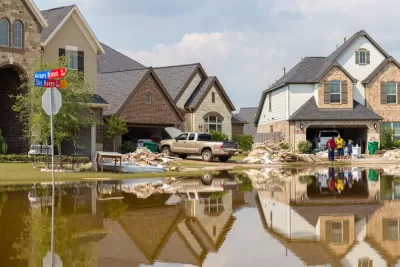Despite the devastation wrought by Hurricane Harvey, builders and buyers alike are sustaining a market for new construction on land likely to get flooded again.

Some Houston developers and homebuyers seem to "see opportunity in devastation," according to reporting by Mike Morris and Matt Dempsey. "One in 5 new homes permitted in Houston in the year after Hurricane Harvey is in a flood plain — some on prairie developed for the first time after the storm — even as new rainfall data showed existing flood maps understate the risk posed by strengthening storms."
Many of those permits went to owners razing and elevating flooded homes, but plenty of new construction is also occurring, including "clumps of townhomes, packing more families into the flood plain."
In April, Houston's city council tightened rules on flood plain construction, extending "regulations from the 100-year flood plain to the broader 500-year flood plain and [requiring] new homes built in those areas to sit higher off the ground." But Mayor Sylvester Turner doesn't see a future in abandoning those areas outright. "Houston cannot and should not abandon a third of the city to avoid flooding any more than San Francisco should abandon numerous established neighborhoods that could be affected by earthquakes," he said.
Other civic leaders disagree, and have called for the eventual depopulation of the flood plain, "perhaps by pouring billions of dollars into buying out tens of thousands of at-risk homes." Meanwhile, some developers think the post-Harvey rebuilding spree will have a limited shelf life, arguing that heightened regulation and the cost of elevated homes will eventually deter builders from choosing flood plain sites.
FULL STORY: Even after Harvey, Houston keeps adding new homes in flood plains

Planetizen Federal Action Tracker
A weekly monitor of how Trump’s orders and actions are impacting planners and planning in America.

Maui's Vacation Rental Debate Turns Ugly
Verbal attacks, misinformation campaigns and fistfights plague a high-stakes debate to convert thousands of vacation rentals into long-term housing.

Restaurant Patios Were a Pandemic Win — Why Were They so Hard to Keep?
Social distancing requirements and changes in travel patterns prompted cities to pilot new uses for street and sidewalk space. Then it got complicated.

In California Battle of Housing vs. Environment, Housing Just Won
A new state law significantly limits the power of CEQA, an environmental review law that served as a powerful tool for blocking new development.

Boulder Eliminates Parking Minimums Citywide
Officials estimate the cost of building a single underground parking space at up to $100,000.

Orange County, Florida Adopts Largest US “Sprawl Repair” Code
The ‘Orange Code’ seeks to rectify decades of sprawl-inducing, car-oriented development.
Urban Design for Planners 1: Software Tools
This six-course series explores essential urban design concepts using open source software and equips planners with the tools they need to participate fully in the urban design process.
Planning for Universal Design
Learn the tools for implementing Universal Design in planning regulations.
Heyer Gruel & Associates PA
JM Goldson LLC
Custer County Colorado
City of Camden Redevelopment Agency
City of Astoria
Transportation Research & Education Center (TREC) at Portland State University
Jefferson Parish Government
Camden Redevelopment Agency
City of Claremont





























